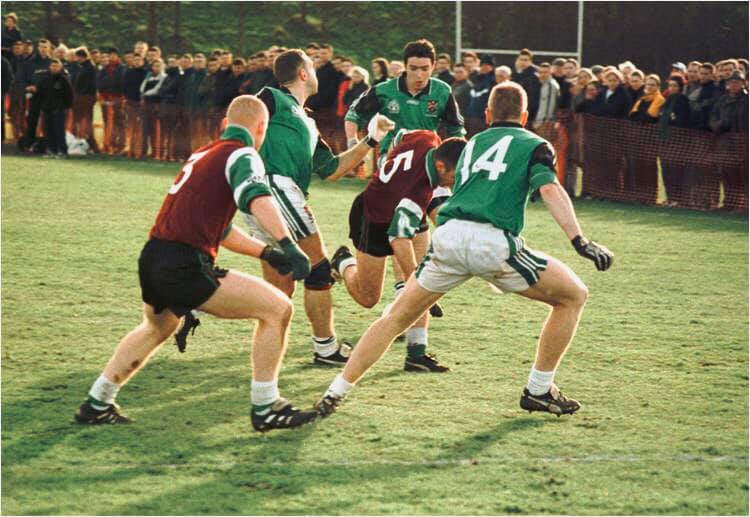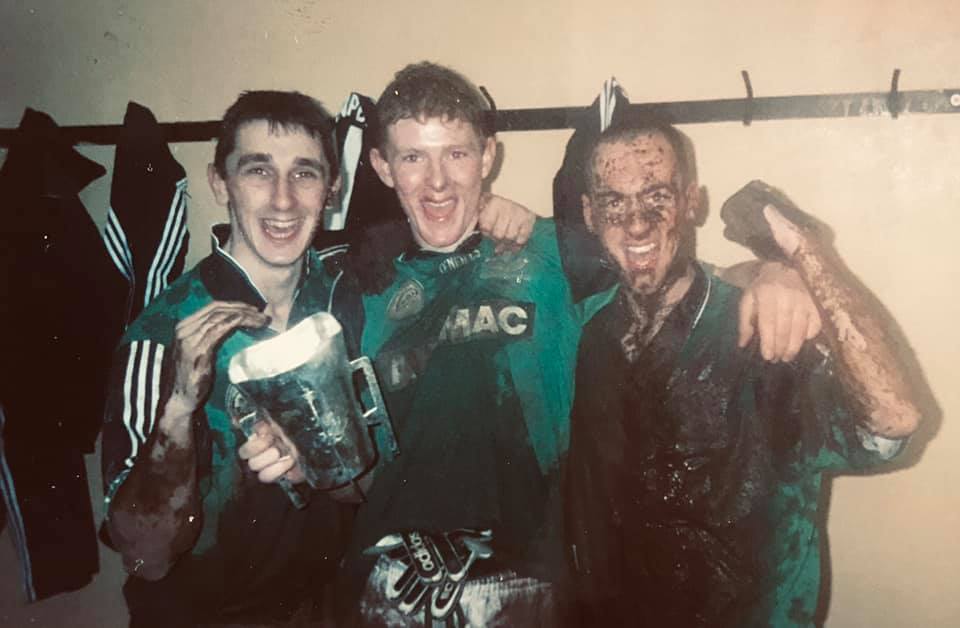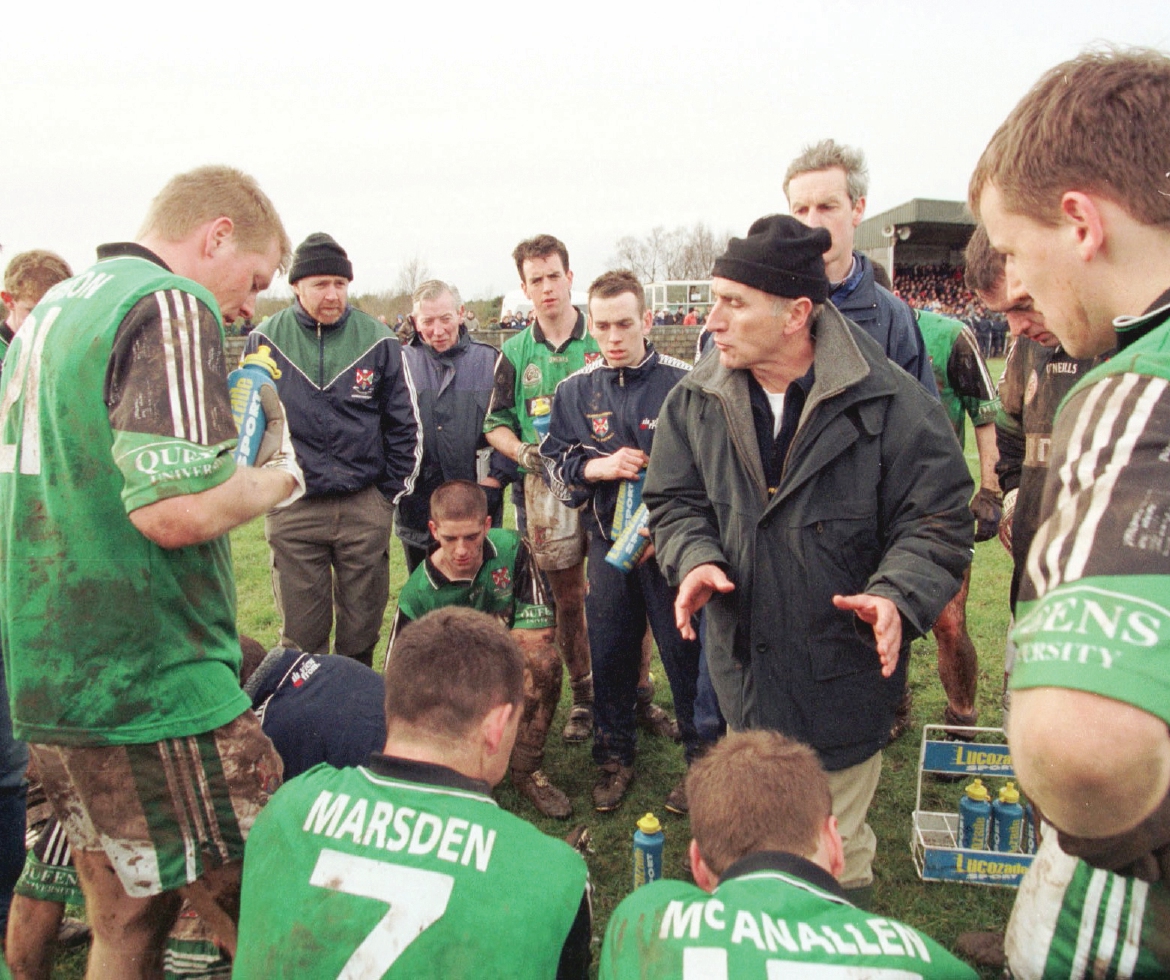It’s 25 years since Queen’s edged out UCD after extra time in the muck and gutters of Maigh Cuilinn to lift the Sigerson Cup. Enda McNulty looks back on their bumpy road to glory. He spoke with Michael McMullan…
SEAN O’Neill planted the Sigerson seed, standing in the middle of St Tiernach’s Park in Clones.
Mullaghbawn had just won the 1995 Ulster Club title. The former Down star fished a handshake for Enda McNulty as the celebrations were kicking off.
On the coattails of a congratulations, O’Neill tagged on the idea of being a Sigerson winner with Queen’s with whom he still held a strong affiliation.
McNulty had just swapped MacRory Cup football with Abbey for life in the big smoke. Success on the college fields would have to wait.
A Fresher team including fellow Sigerson Cup winning teammates Aidan Quinn, Peter Quinn and Tom Brewster lost a semi-final to UCC.
The Sigerson Cup opener the following year ended in defeat at the hands of newbies Tralee RTC who were setting sail on winning three titles in a row.
McNulty and Queen’s made it to the semi-finals the following season, losing to rivals UUJ at the weekend in Tralee.
Hosting the competition the following year, Queen’s had beaten the Garda College to win the Ryan Cup (league title) and were in position against them in the Sigerson semi-final on home soil at the Dub.
“We were absolutely rocking,” McNulty said of their eight-point lead, 1-8 to 0-3 in the early stages of the second half.
Then came two late goals with the Guards’ long ball, smash and grab win. Queen’s were shellshocked.
“I’ll never forget it,” McNulty said, remembering every second like it was yesterday. “I cried like a baby in the changing rooms.”
He can remember Sean O’Neill literally helping him out of the dressing rooms.
As the squad tried to make sense of it all in the Botanic Inn that night, McNulty was still “absolutely” inconsolable. Living in each other’s pockets, they’d poured everything into it – mentally and physically.
“I remember some of the girls that I knew at the time coming over to me and said ‘what’s wrong? What the hell’s wrong with you?’” he recalls.
Another memory, McNulty never forgot their first night back at training the following season.
With trainer John McCloskey’s warm-up complete, Dessie Ryan brought the group into a circle. It was time to look backwards before stepping forwards.
“Fellas, it’s my fault, it’s my fault that we lost the Sigerson last year. I got it wrong,” Ryan told the group.
The image is still clearly locked in McNulty’s head. Wellies on, blue coat and great trousers, Ryan was baring his heart to a group of young men on a cold night in south Belfast.
Ryan told them he was taking responsibility for planning for everything else but didn’t envisage the Guards bombing in the high balls that led to the late killer goals. He was taking “100 per cent” of the blame.
Now the CEO of McNulty Performance, he namechecks podcaster Brené Brown and her depiction of an acceptance of accepting the blame.
That’s now, but Ryan was ahead of his time. As he stepped around his Ballyronan home in the winter of 1999, he rued not rolling out his trademark training ground walkthroughs on defending the high ball.
Cards now on the table, the Queen’s 2000 crop went to work. McCloskey’s training regime had them perfectly tuned for Sigerson and the need to play three games in as many days.
Dr John Kramer was the other link in the chain. In games, he’d observe the body language of players, any signs of frustration or a lapse in concentration before tapping Ryan on the shoulder.It helped how any half-time message was dressed. That was the beauty of Dessie Ryan, aside from his detailed technical coaching and game intelligence, he was able to translate Kramer’s volume of knowledge into one or two key points in a dressing room.
When Tom Brewster’s free took UCD to extra-time in the final, it was Ryan’s six-second dressing room masterclass that, as McNulty believes, won the title. We’ll come back to that.
***
Pound for pound, Diarmaid Marsden was the best footballer McNulty has ever walked out of a dressing room with. An incredible footballer. An incredible guy. And teak tough.
Renshaw’s Hotel, deep in Belfast’s Holy Lands, was the epicentre of the student GAA world.
McNulty recalls his Queen’s wing men taking exception to something offered from one of the St Mary’s players on a night out. That night, it spilled into a row outside Renshaw’s. Marsden didn’t take a backward step.
“Boys were going toe to toe and Diarmaid was unbelievably good at handling himself,” McNulty recalls.
When the teams met in the Ryan Cup that year, St Mary’s were winners. McNulty and Paddy McKeever were just home from the All-Stars’ night in Dublin.

LOCAL RIVALS…Queen’s beat St Mary’s on their wayto winning the 2000 Sigerson Cup
Dessie Ryan knew there were beers to be had in the capital but wanted the duo up the road, for team spirit more as much as anything else.
“He brought me on with five minutes to go,” McNulty said. “I was in terrible shape, Paddy probably in worse shape.”
St Mary’s ran out winners. In the Queen’s dressing room at the Dub, lay a pile of dirty and sweaty jerseys. And silence. It was total silence, only broken by thumps on the door from the winning team. It was a league game but it was derby. Bragging rights are important.
“The Mary’s boys were going crazy next door,” McNulty said. “You could hear them singing.”
After gathering his thoughts, Dessie Ryan addressed his squad, knowing the teams were on the same Sigerson Cup path in the draw.
“Their silence will be our song in the Sigerson,” he told the players. And when they turned the tables, the message was simple. Queen’s players were to tog in, get showered, lift their bag and file out. Silence was song.
Beating a talented St Mary’s team was a step on the way. For Queen’s, winning the competition was a realistic possibility.
In their bubble, the mission was simple – win the Sigerson Cup. Wins over St Mary’s and Sligo IT was their passport to the weekend in Galway.
“We were no saints when we were Freshers in first or second year,” McNulty admits.
On his watch, Ryan demanded high standards. There wouldn’t be a glass broke or a cup broken. When staying in hotels, the staff deserved respect. Small things, yet massive.
“The culture he set, it was just incredible,” McNulty summed up.
Ryan backed the players but it had to be a two-way street. During the season, there was a whimper of some player “dissent” at the direction plans were going. Was the gameplan working?
John Kramer was sounded out about how to address it. For him, it was an interval player issue. Not one for Dessie. The leaders needed to nail it. The dressing room door was closed one day and it was time for honesty. Players were in or they were out.
The group would be following Ryan’s plan. Anyone not locked in was free to leave. Stay on board, well, it was time to fasten the seatbelts.
***
Limerick’s Mary Immaculate College were Queen’s opponents in Friday’s quarter-final with Kerry’s Dara Ó Cinnéide their star man.
Ryan hatched a plan. McNulty was to drop back 10 metres from his centre back berth. Full-back Peter Quinn was to push out, closing Ó Cinnéide as the meat in the sandwich.
He failed to score. Queen’s won. A box ticked. They could now move on to Sigerson Saturday and a semi-final with UCC.
Another part of the blueprint was converting Aidan Quinn into their goalkeeper in an era before sweeper ‘keepers have flooded the game.
“He (Ryan) wanted to play a ‘keeper who was probably well able to come off his line if needed and maybe play a long ball. Dessie loved that long, accurate football pass,” McNulty said of the move.
There was also the telepathy. Quinn and McNulty “just clicked” in the defensive unit. They also had a signal for slowing down a game when the temperature needed taken down.
Beating UCC was far from straightforward. After finding themselves five points down, Queen’s notched the game’s next eight points to ensure victory. Another step.
“Cormac McAnallen, what a superstar of a player, what a man,” McNulty said of their comeback.
“People like Diarmaid Marsden, Paddy McKeever, Tom Brewster, Liam McBarron. Just brilliant fellas, great at grinding out scores, knowing how to get a score, even though it looked like it was very bleak.
“I remember, vividly, everybody just digging in and, under Dessie, that was the form. We just had so much respect for the man.
“We were so well conditioned under John McCloskey, that we would actually get stronger towards the end of the game, even though we were obviously two games in at this stage, even though we were well down.”
It was a level conditioning honed on the pitches at the Dub and the hills of Barnett’s Park.
Coupled with Kramer’s reading of people and Ryan’s reading of a game, it was the perfect mix. But there was no cup in the middle of the dressing room. Not yet.
No words here will do justice to the Maigh Cuilinn pitch for the final with UCD. Take a peek at the game on YouTube for a proper look. Muck and clabber. Was it any wonder. It was now into a fourth day of incessant rain.With a tight schedule of county action to follow, Sigerson weekend was Sigerson weekend. End of story. The game was never going to be called off.
“When we turned up to the pitch, I just literally couldn’t believe it,” McNulty said of the puddles.
Ryan would tell the players to familiarise themselves with the area of the pitch they’d be playing in. The goalkeepers in the penalty area. Corner-backs in their likely patch.
For McNulty, the centre back zone was soaking. And a ball had not yet been kicked, never mind the extra-time to follow.
“We were all looking around. going, ‘there’s no way this is going to go ahead’ so of course, there was a doubt about it but it made for the occasion,” McNulty said.
Liam McBarron’s first-minute goal was decisive in a 1-8 to 0-8, a score straight from the training ground. Dessie Ryan, repetition and coaching, all in the same sentence.
Tom Brewster or Paddy McKeever would be floating in balls. Joe Quinn a target man and diagonal balls.
“Liam McBarron was just a phenomenal footballer and brilliant athlete but that (goal) would have been rehearsed hundreds of times before that situation,” McNulty said.
Brewster’s kick found McKeever who pinged a pass over the top, into McBarron’s run. Perfection. And, boom, he launched a shot to the top corner.
In a low scoring game, Aidan Quinn’s vital save with 10 minutes remaining was another key moment. UCD drew level from the ‘45 before then going ahead.
Were Queen’s looking down the barrel of another near miss? They were, but time was still on their side.
A long Joe Quinn pass picked out McKeever who was fouled. It was pressure kick time but Brewster, kicking across his body, nailed the equaliser and when Marsden pulled a late chance wide, the teams were heading for extra-time.
“Training at Queen’s with Dessie normally would have lasted, let’s say, two and a half hours,” McNulty said of their groundwork.
A warm-up, honing the basic skills and a match where it would always be next scores wins. Again and again.
Joe Quinn’s kick pass was one of repetition. Tom Brewster’s kick the same. All wrapped in a narrative of ‘let’s get the next score’.
“We’d stay and do more skills, maybe five or six fellas,” McNulty recalls.
“I wasn’t surprised that Tom Brewster scored that point because he conditioned it so many times.”
With the Queen’s players tucked inside the dressing room ahead of extra-time, there was no sign of Ryan.
It was a battle zone. Sweat. Muck. Reflection. Water. Bananas. A realisation they needed another walk to the well. But McNulty’s scan of the faces sounded an alarm.
“I remember vividly,” he said. “I’ll be very honest, the mentality was we were exhausted, we were spent.”
There was still no sign of Ryan. Where was he? Had they blown their chance? What happens next? It was the players, alone with their thoughts.
“It seemed like five minutes later but it must have been two minutes later, the door busted in,” McNulty said of the sight of Ryan bursting open the dressing room door.
There he was in his wellies, covered in muck, kicking water bottles everywhere.
“These f**kers don’t want to play it, these f**kers don’t want to play it. They don’t want to f**king play it,” Ryan bellowed, telling his players the UCD players wanted a replay on another day on a better sod and fresher limbs.
To a man, every Queen’s player stood up. The room completely changed instantly. They were finishing what they started. Right there, right now.
“Our mentality had changed in six seconds,” McNulty said, hearing later how Ryan concocted the story to give his players the kick they needed.
Back on the pitch, Queen’s won extra-time 0-4 to 0-1 and were champions again. After the hard luck stories, their mission was complete.

WING MEN…Paddy Campbell, Tom Brewster and Kevin McElvanna with the cup after Queen’s won the 2000 Sigerson.
“For me, that was the winning of the Sigerson,” McNulty says with conviction.
“If Dessie hadn’t have said that, my God, I have no doubt we would have lost that Sigerson match. I have no doubt whatsoever.
“He changed the mental and emotional state of the team at the drop of a hat. It was incredible. I’ve never seen the likes of it. I’ve been in changing rooms all my life, since I’ve been four years of age.”
Enda McNulty wouldn’t sell his Sigerson medal for £20m. Does he mean it literally? Who knows? But the tone of his voice tells how important it was.
After losing a litany of big games in his Queen’s career, he finished with the biggest prize and it was an extra push towards winning Sam Maguire with Armagh two years later.
“The singing, the dancing, literally, I’d say there wasn’t one wink of sleep that night down in Maigh Cuilinn,” McNulty said of their celebrations.
There were turf fires along the road back to the hotel. Memories not to be forgotten. His parents. His brother Justin, who missed out on lifting the cup 12 months earlier.
“John Kramer, I’ll never forget, he was drinking bottles of Heineken to beat the band,” McNulty laughs.
“It was just amazing memories. The fellas sang and danced together with the UCD boys that night at the post-match event, just incredible memories.”
Sean O’Neill’s words come back. A Sigerson Cup medal with Queen’s. The last box ticked.
The full interview with Enda McNulty is available on our latest episode of Gaelic Lives, via YouTube or Spotify.
Receive quality journalism wherever you are, on any device. Keep up to date from the comfort of your own home with a digital subscription.
Any time | Any place | Anywhere












